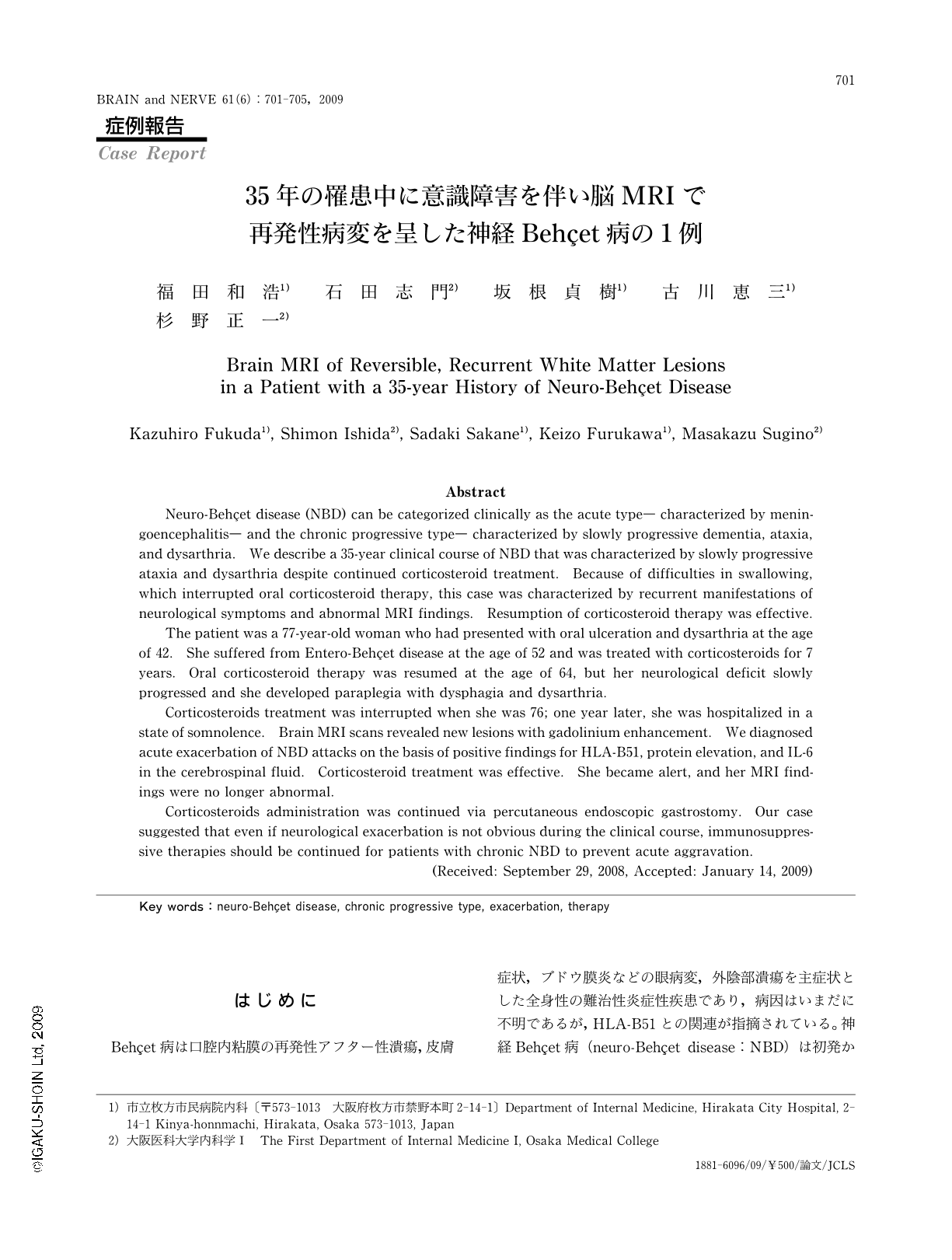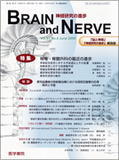Japanese
English
- 有料閲覧
- Abstract 文献概要
- 1ページ目 Look Inside
- 参考文献 Reference
はじめに
Behçet病は口腔内粘膜の再発性アフター性潰瘍,皮膚症状,ブドウ膜炎などの眼病変,外陰部潰瘍を主症状とした全身性の難治性炎症性疾患であり,病因はいまだに不明であるが,HLA-B51との関連が指摘されている。神経Behçet病(neuro-Behçet disease:NBD)は初発から一定の期間を経た遷延期に運動失調や構音障害,認知機能低下など多彩な神経症状や精神症状を呈して進行性の経過をとることが知られている1,2)。慢性進行期のNBDはステロイド治療に抵抗性であり3,4),再発発作を繰り返す症例や治療中断後に増悪する症例は予後不良であり1),死亡例も報告5)されている。
われわれは,35年に及ぶ長期のNBD罹患歴があり,対麻痺,構音障害,認知機能低下などを呈した慢性進行期に嚥下障害の進行からステロイドの内服を中止したところ,約1年後に意識障害を認め,脳MRIにて再発性の脳病変を呈した高齢のNBD症例を経験した。本症例では,慢性進行期における急性増悪の病態に対してステロイド治療がよく反応して臨床症状およびMRI画像にて改善が認められたのでここに報告する。
Abstract
Neuro-Behçet disease (NBD) can be categorized clinically as the acute type― characterized by meningoencephalitis― and the chronic progressive type― characterized by slowly progressive dementia, ataxia, and dysarthria. We describe a 35-year clinical course of NBD that was characterized by slowly progressive ataxia and dysarthria despite continued corticosteroid treatment. Because of difficulties in swallowing, which interrupted oral corticosteroid therapy, this case was characterized by recurrent manifestations of neurological symptoms and abnormal MRI findings. Resumption of corticosteroid therapy was effective.
The patient was a 77-year-old woman who had presented with oral ulceration and dysarthria at the age of 42. She suffered from Entero-Behçet disease at the age of 52 and was treated with corticosteroids for 7 years. Oral corticosteroid therapy was resumed at the age of 64, but her neurological deficit slowly progressed and she developed paraplegia with dysphagia and dysarthria.
Corticosteroids treatment was interrupted when she was 76; one year later, she was hospitalized in a state of somnolence. Brain MRI scans revealed new lesions with gadolinium enhancement. We diagnosed acute exacerbation of NBD attacks on the basis of positive findings for HLA-B51, protein elevation, and IL-6 in the cerebrospinal fluid. Corticosteroid treatment was effective. She became alert, and her MRI findings were no longer abnormal.
Corticosteroids administration was continued via percutaneous endoscopic gastrostomy. Our case suggested that even if neurological exacerbation is not obvious during the clinical course, immunosuppressive therapies should be continued for patients with chronic NBD to prevent acute aggravation.
(Received: September 29,2008,Accepted: January 14,2009)

Copyright © 2009, Igaku-Shoin Ltd. All rights reserved.


